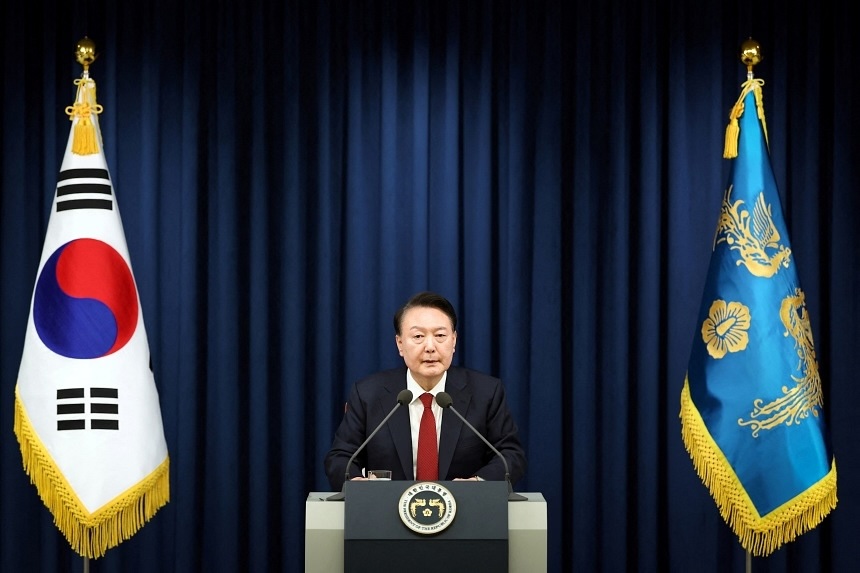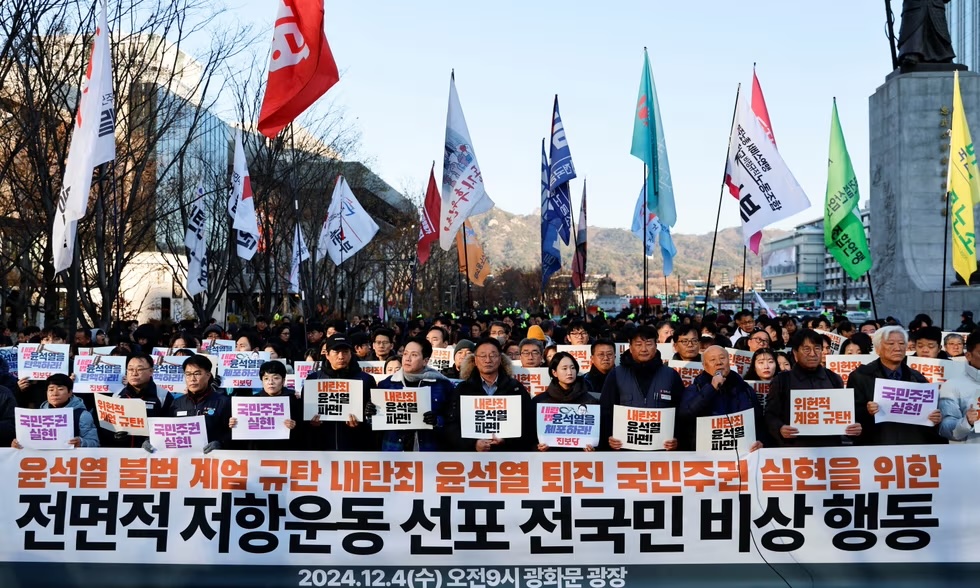While some of us were sound asleep yesterday night, South Korea was making history — and by history, we don’t exactly mean the “good” kind of history.
Yesterday, martial law was declared over South Korea for the first time in over four decades. Although it ended about six hours later, many are still enraged by what happened.
Here’s everything you missed about the South Korean martial law saga while you were asleep.
South Korean President Yoon Suk Yeol Declares Martial Law
On Tuesday (3 December), South Koreans turned on their TVs to find themselves greeted not by their favourite late-night shows, but by a late-night TV broadcast from the South Korean President Yoon Suk Yeol.
The purpose of the broadcast? To declare martial law.

Huh? Martial law is simi? Got something to do with martial arts?
If you didn’t already know, the South Korean President has the power to declare martial law in times of national emergencies. For instance, where there is war or armed conflict.
In South Korea, there are two types of martial law — emergency martial law and security martial law. The one which was invoked by President Yoon yesterday night was the former — emergency martial law.

So, the million-dollar question is: what is emergency martial law?
Emergency martial law essentially grants the government all sorts of powers which you can think of. Power to restrict freedom of speech, limit publications, implement special changes to the authority of governments or courts, and more.
You can think of it like this lah: when martial law is imposed, the government can, more often than not, do just about anything they want. The precise measures that are implemented during martial law is up to the government lah.
So, for yesterday night’s martial law declared by President Yoon, the particular measures which were implemented included the prohibition of all political activities (including the operation of South Korea’s National Assembly, which is essentially South Korea’s Parliament), the prohibition of socially disruptive acts such as strikes, and more.
Those who violate these martial law prohibitions could be arrested, detained, searched, and seized without a warrant. And of course, violators will also be punished accordingly lah.
In other words, in case you haven’t caught onto it by now, martial law is quite a big deal. It’s no wonder that the last time which martial law was declared in South Korea was all the way back in 1979, in response to a military coup following the assassination of then-President Park Chung-hee.
Some of us weren’t even born then.
Why was Martial Law Declared?
If martial law is such a big deal, then why did the South Korean President decide to declare martial law? Was there a very compelling reason for it?
Well, we’ll leave it up to you to decide whether President Yoon’s given reasons were sufficiently compelling. But here’s a summary of why he decided to declare martial law.
According to the 63-year-old President, martial law had to be declared to respond to the threat of anti-state forces.
“To safeguard a liberal South Korea from the threats posed by North Korea’s communist forces and to eliminate anti-state elements plundering people’s freedom and happiness, I hereby declare emergency martial law,” President Yoon stated during his surprise late-night broadcast.
The President added that the South Korean National Assembly (which is South Korea’s version of Parliament) has become a “haven for criminals” and “a den of legislative dictatorship”.
But, who exactly are these “criminals” and “anti-state forces” in Parliament? According to President Yoon, it’s the main opposition Democratic Party, which currently has a majority in South Korea’s 300-member Parliament — that’s why he had described Parliament as “a den of legislative dictatorship”.
In other words, in President Yoon’s eyes, the “national emergency” which the declaration of martial law is meant to respond to are the Democratic Party members in the South Korean National Assembly. As he himself said, these party members are “intent on overthrowing the regime”.
And that’s the gist of why the South Korean President decided to declare martial law.
South Korean Parliament Votes to Block the Martial Law Declaration; Martial Law Eventually Lifted
While you can decide for yourself whether you think President Yoon’s stated reasons for declaring martial law are compelling, it seems that many in South Korea think it is not.
Many South Koreans rushed to gather outside South Korean Parliament in protest of the declaration of martial law. Even the leader of Yoon’s own ruling party, the conservative People Power Party, opposed the declaration of martial law, calling it “unlawful and unconstitutional”.
But those who were the most unhappy with the martial law declaration were probably the opposition lawmakers — you would be too, if you were just labelled as an “anti-state force” on national television.
In a live YouTube broadcast, Democratic Party leader Lee Jae-myung declared that President Yoon had betrayed the South Korean people. At the same time, opposition lawmakers rushed to gather at the National Assembly, fighting their way through security forces so they could vote to overturn the martial law.
You might be thinking: “Why did they have to fight their way through?”. Well, remember what we said earlier — one of the measures implemented during the martial law was the prohibition of political activities, which includes the operation of South Korea’s National Assembly.
So, by right, these lawmakers shouldn’t be there in Parliament during martial law lah. But, “by left,” it’s a different story.
Early on Wednesday (4 December), the South Korean National Assembly passed a motion with 190 out of its 300 members present, requiring that the martial law declaration be lifted.
For context, under South Korean law, if a majority in the National Assembly vote for martial law to be lifted, then the government must lift the martial law.
Eventually, President Yoon took heed and abandoned the martial law attempt, just about six hours after he declared it.
“We will accept the National Assembly’s request and lift the martial law through the Cabinet meeting,” President Yoon announced.
The Aftermath: Will This Be The End of Yoon Suk Yeol’s Presidency?
While the martial law declaration has been lifted, many are still enraged by the events of yesterday night. In particular, many are enraged at the man behind it all — President Yoon.
For one, countless South Koreans have gathered to demand that President Yoon be removed from power.

The Democratic Party has similarly called on President Yoon to stand down immediately. If he doesn’t, the party (which, if you recall, has a majority in the South Korean National Assembly) has said that it would take steps to impeach him.
The party added that President Yoon’s declaration of martial law was “a grave act of rebellion and provides perfect grounds for his impeachment.”
Even senior aides working for President Yoon have offered to resign en masse following the chaotic night.
So, what do you think? Does the South Korean martial law saga toll the death knell for Yoon Suk Yeol’s presidency?




